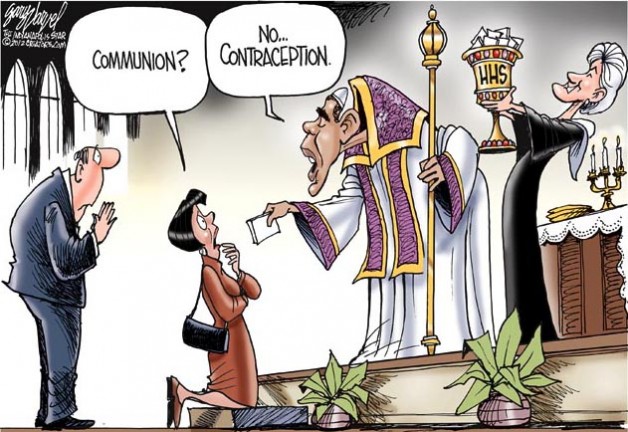The expression “voodoo economics” has fallen out of vogue in contemporary public discourse. It was George H. Bush who first coined the phrase while running for the Republican nomination in 1980, but President Obama’s press conference last Friday is what brought it to mind. Announcing a new “compromise” on the contraceptive mandate, the President declared that health insurers will now provide contraception and sterilization services for all women free of charge. This prompts one to ask, “If insurers can provide contraception and sterilization services for free, why was the federal government trying to force folks to pay for it in the first place?” Before we take up this question, let’s briefly review the history of the controversy to date.
Last month, I wrote a post here on Dominicana about the contraceptive mandate that the Department of Health and Human Services has introduced as part of the new federal healthcare law. This mandate would have required all employers, except for a very narrow class of entities, to provide their respective employees insurance coverage for contraception and sterilization products and services. It would have forced Catholic universities and hospitals, as well as Catholic business owners and operators, to violate their consciences by financing practices and procedures that are contrary to human dignity and harmful to society.
The proposal ignited an immediate backlash from Catholics and non-Catholics alike. Of course, Catholic organizations objected to their being compelled to support practices that the Church, in keeping with Scripture, Tradition, and centuries of reasoned moral discourse, steadfastly opposes. But many other organizations, religious and secular alike, also raised objections, questioning the federal government’s right to compel individuals to act against their consciences.
The controversy has had its benefits. First, Christians of several denominations joined forces with the Catholic Church in opposition to an unprecedented threat to religious liberty. In a nation where public policy has more than once reflected the unfortunate divide between Catholic and Protestant, we have witnessed a broad-based, collective Christian response of a kind perhaps never before seen in this country. The mandate even prompted former GOP Presidential candidate and Baptist minister Mike Huckabee to tell a crowd in DC on Friday, “Thanks to President Obama, we are all Catholics now.”
Second, the controversy has sparked a healthy conversation about the practice of contraception and sterilization itself. Whether you approve of the Church’s teaching on artificial birth control or not, Paul VI’s predictions concerning its effects on people and society—especially its threat to the integrity of the family and its contribution to the degradation of women—have proved accurate. Our society as a whole needs to reconsider its ingrained “contraceptive mentality;” it needs to rethink its commitment to the supposed “panacea” of easy birth control, its faith in the false promises of the contraceptive revolution.
Considerations such as these prompt us to think that the political storm cloud of the last couple of weeks has something of a silver lining. But what about the most recent developments?
On Friday, the President stated that, under his latest plan, if a religious employer (note well: private or “non-religious” Catholic employers will still be forced to pay up directly) objects to financial participation in the federal government’s contraceptive mandate, its health insurance company will be required to contact its employees directly in order to offer contraception and sterilization coverage “free of charge.” Why, we might ask, would the insurance company provide such coverage “free of charge?” Well, as a senior administration official has explained, forcing insurance companies to provide these services will actually save them a lot of money because—get this—contraception and sterilization are a lot cheaper than pregnancy and childbirth. In other words, it is in the insurance companies’ interest to make sure that women have as few children as possible, and so it is also in their interest to sterilize as many women as are willing and, for the rest, to keep them on a steady supply of birth control drugs.
Yet, if the administration’s economic analysis is correct, why was anyone being asked to pay for contraception and sterilization coverage in the first place? Why wasn’t contraception and sterilization always free? The President might well have uncovered the greatest “fleecing” of large swaths of the American public that society has ever witnessed. Shouldn’t folks who have been actually paying for this stuff over the years rush out and ask for their money back?
Well, don’t ask for those rebates just yet. Upon further examination, the President’s “voodoo economics” proves untenable. Unless the medical manufacturers, distributors, and professionals who offer drugs, devices, and procedures start providing their products and services for free, someone still has to pay. Not surprisingly, pharmaceutical companies, pharmacists, and others haven’t made an announcement that they will cease charging for their work. If they receive no payment from employers or employees, the only people left to foot the bill are the insurers. And where do the insurance companies get their money? From the subscribers who pay for insurance policies. In the end, regardless of how insurance companies find a way to spread the cost, the federal government will still compel us, in one way or another, to subsidize contraception and sterilization.
While the jury may be out as to whether then-candidate George H. Bush was correct in describing supply-side economics as “voodoo,” the term surely applies to President Obama’s latest “compromise.” Suggesting that contraception and sterilization will now be “free of charge” is not just misleading; it’s disingenuous.
Last month, the President seemed to think that Catholics were too weak to defend their religious liberty. Now he seems to think we’re too stupid.
✠
Image: Gary Varvel, Contraception Mandate







